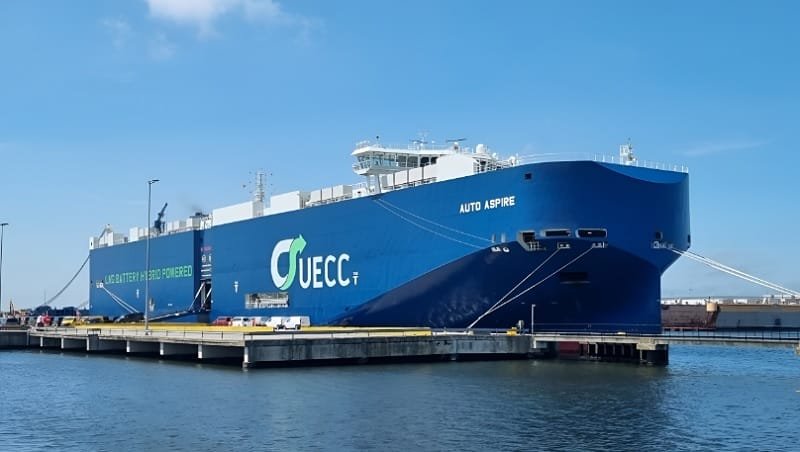Luxury vehicle manufacturer JLR has partnered with UECC’s pioneering Sail for Change initiative, leveraging low-carbon liquefied biomethane (LBM) to reduce emissions in maritime transport. This collaboration aligns with JLR’s sustainability objectives by decarbonizing its global logistics chain.
Table of Contents
Expanding Participation in Sail for Change
JLR’s participation brings the total number of vehicle manufacturers in the initiative to four. Launched in 2024, Sail for Change employs LBM, or bioLNG, supplied by Titan Clean Fuels, to fuel UECC’s fleet of five dual-fuel LNG Pure Car and Truck Carriers (PCTCs). Operating in the European shortsea trade, these vessels achieve significant emissions reductions.
The initiative began with Green Gas Month in July 2024 and has been extended into 2025, supported by a new supply agreement with Titan to secure LBM availability at the Port of Zeebrugge. This agreement is expected to reduce over 75,000 tons of GHG emissions in 2025 alone.
Regulatory Pressures Drive Industry Interest
UECC’s Energy & Sustainability Manager, Daniel Gent, welcomed JLR’s involvement, emphasizing the growing importance of sustainable maritime transport. “We’re delighted to have another valued customer onboard with Sail for Change. JLR has shown a strong interest in developing sustainable maritime transport solutions, and this is a big step in that direction,” he stated.
JLR, renowned for its Range Rover, Defender, Discovery, and Jaguar brand, plans to deliver electric models of all its luxury vehicles by 2030. The company aims to achieve net-zero emissions across its entire value chain by 2039, addressing decarbonization across manufacturing, operations, supply chain logistics, and vehicle emissions.
Gent highlighted that increased environmental concerns and regulatory pressures, such as the EU Emissions Trading System (EU ETS) and FuelEU Maritime regulations, are driving interest in sustainable initiatives like Sail for Change. These regulations impose higher costs for pollutive vessels and stricter carbon intensity reduction targets starting January 2025.
Commercial and Environmental Incentives
Gent further noted that customers already participating in Sail for Change view LBM as a crucial decarbonization tool. “We have seen customers expanding the scope of their engagement—covering more port pairs and volumes of units—and expressing interest in long-term commitments through 2027,” he said.
UECC has taken a proactive stance in adopting alternative fuels such as LBM and bio-diesel across its 15-vessel fleet, significantly reducing its carbon footprint. The company is also exploring zero-carbon fuels like hydrogen and ammonia as part of its broader goal of achieving net-zero operations by 2040.
A Platform for Alternative Fuels
The newly secured supply deal with Titan provides UECC with what Gent describes as “an excellent platform to build a long-term commitment to alternative fuels.” By utilizing bioLNG, UECC ensures carbon-neutral loading operations across its port network, with verified emissions data accessible to customers via a CO2 registry.
Gent emphasized the potential of LBM to deliver emissions reductions beyond the estimated 25% achieved with LNG, virtually eliminating particulate matter, nitrogen oxide, and sulfur oxide emissions. “This is reflected not only in the Scope 3 emission reductions seen by our Sail for Change customers but also by UECC as a whole as we prepare for FuelEU Maritime requirements,” he concluded.
Why LBM?
UECC’s Energy & Sustainability Manager Daniel Gent highlighted the advantages of LBM, noting its sustainability credentials, technical feasibility, and growing availability. LBM’s potential for net-zero or even net-negative emissions, factoring in avoided waste emissions, makes it a compelling choice for immediate decarbonization.
“LBM offers a cost-effective solution to meet regulatory carbon intensity limits and enhance green compliance. This benefits our clients by reducing their Scope 3 emissions and mitigating costs linked to new regulations,” Gent said.
Road to Fossil-Free Operations
UECC plans to achieve 20% LBM usage across its 15-vessel fleet by 2030, supplemented by 17% biofuel and 20% LNG usage, with alternative fuels expected to make up 55% of its fuel mix. The company is also exploring e-methane as a renewable fuel option to meet 10% of gas demand by 2025.
The sustainability push includes eco-friendly fleet expansion, with two multi-fuel battery hybrid vessels set for delivery in 2028, alongside options for two more.
This partnership between JLR and UECC represents a significant step forward in achieving sustainable maritime transport and highlights the growing momentum in the industry to address environmental challenges collaboratively.
About UECC
United European Car Carriers (UECC) is a leading provider of sustainable short-sea RoRo transportation solutions in Europe. Operating a modern fleet of eco-friendly RoRo vessels, UECC is committed to driving innovation in alternative fuels and emissions reduction technologies, setting industry benchmarks for environmentally responsible shipping.
Source UECC

